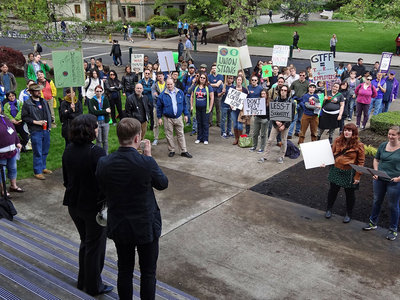
Dental coverage and living wages are not something people think about if they already have them. But when a worker doesn’t have one, or in the Graduate Teaching Fellows Federation (GTFF) of the University of Oregon’s case, either, this can lead to not only health problems, but also to friction when it comes to contract negotiations.
The UO GTFF 3544 held a rally Friday, April 25, outside Johnson Hall to spread awareness about what the union says is the administration’s lack of ability to meet with the GTFF and provide fair negotiations.
“The purpose of the rally was to show the administration that we’re frustrated for working without a contract for about a month now,” says Shawna Meechan, a bargaining team member.
The GTFF attempted to negotiate salary by dropping the 6.1 percent increase in salary they originally proposed down to a 5.5 percent increase. The UO administration came back to the GTFF with a counterproposal one week later that featured a 2 percent increase in minimum GTF salaries for the year and a 2.5 percent salary increase for the following year. GTFs teach 18 percent of lectures at the UO and lead 95 percent of discussion sections and 82 percent of labs, according to statistics from the UO’s Admissions Office. That’s about one-third of the school’s instructional hours, the union says.
The administration’s counterproposal was deemed to be so unfair that during the bargaining session observers left the room to join the protesters outside. GTFs argue that because of inflation, their raise would only be about a .33 percent increase if the administration’s proposal stands.
“We think [a 5.5 percent increase in salary] is a fairly reasonable demand given that the financial aid office at the UO has published what it takes to live in Eugene and a lot of our members live below that line,” says Joe Henry, vice president of external relations for the GTFF.
Meechan says that the GTFF’s original proposal was an attempt to bridge the “living wage gap” that is experienced at the UO.
GTFs at the lowest levels make $553 a month and GTFs with the highest level of experience and working the maximum 19.5 hours a week allowed make $1,617 a month over a nine month period, according to the UO Graduate School. The UO estimates it costs $1,620 a month for a graduate to live in Eugene.
The administration also offered a 5 percent increase for the dependents of GTFs in premium health care coverage. GTFs countered that the national average is 10 percent.
The GTFF will hold another rally at noon Thursday, May 1, on the street side of the Prince Lucien Campbell hall at the UO. The rally will be in celebration of the international labor holiday and part of the Global Climate Convergence, but also to support the continuing negotiations of the GTFF.